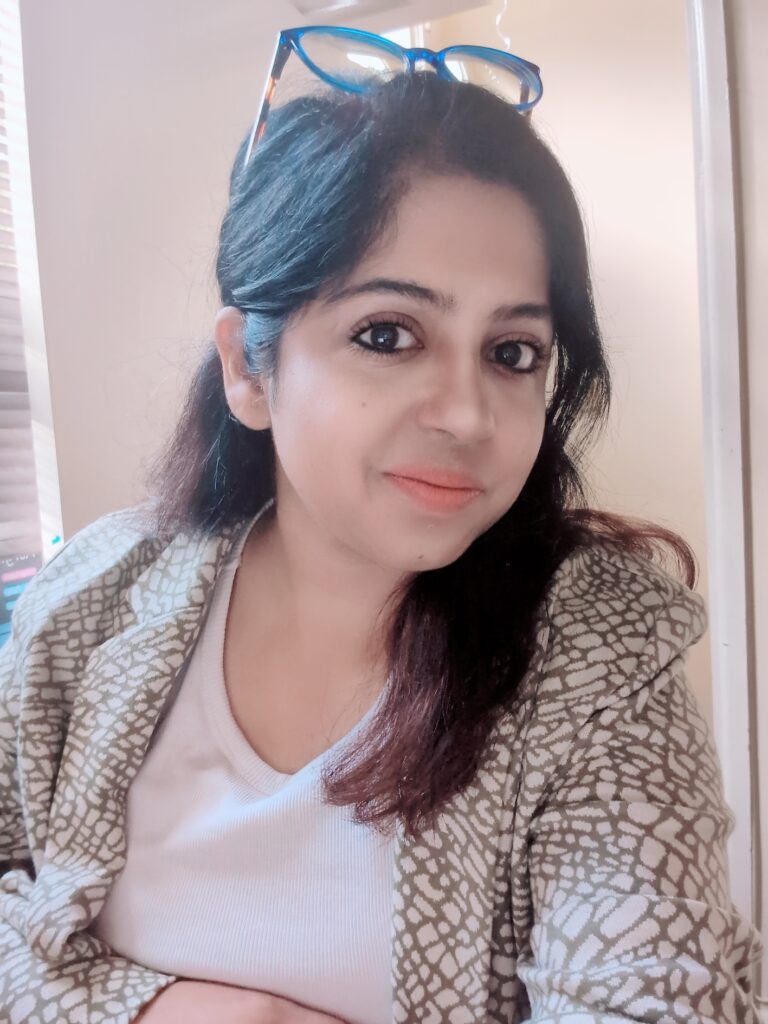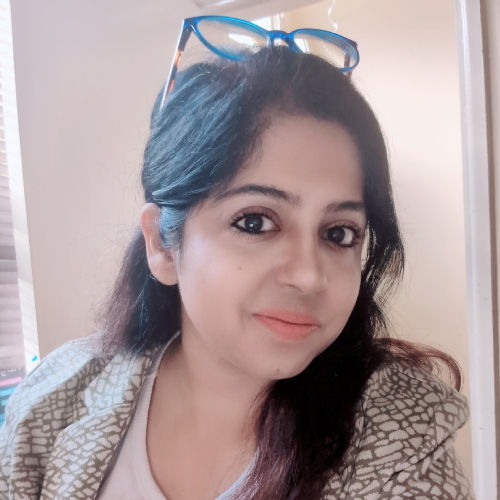

Preeti Suri is originally from India. She’s currently living and studying in the UK at Coventry University, having recently completed a Masters’ in Applied Linguistics and English language teaching. It was in the UK that Preeti had her first experience of virtual exchange.
Preeti is undertaking a PhD now, and was involved in Marina Orsini’s ‘Female Voices in the Third Space’ virtual exchange project, also at Coventry University.
What was your experience of this VE/coil project?
This was a mandatory component of my Masters’, so I participated as a student first of all, before taking on a role as a facilitator.
It was a wonderful experience and really eye-opening for me. At first, I was very nervous as a non-native English speaker. I worried about what others would think of my accent. This feeling was short-lived, I have to say.
You’re an English language teacher, so did participating in this VE enable you to express yourself freely in a safe space?
I am speaking from my perspective here and I quickly felt included and a valued participant in this VE project. I have taught in India for 10 years, and my background means that I have not felt valued or heard before. My society is a very patriarchal society with hundreds of different languages and cultures. This ‘Female voices in the Third Space’ project made me feel really valued and I felt I could participate especially in the breakout rooms. For the first time, people were curious about me and asked me questions. I felt respected and heard. I had things to say. Before, I didn’t know what a breakout room was!
What happened in the breakouts and when was that light bulb moment?
These were so valuable. We never used breakouts in India, therefore it was a whole new concept. The facilitator made sure that we all we able to participate and participation was not based on gender. It was amazing with students from the UK, Brazil, Sri Lanka and more. The facilitator shared his own experience first and made us feel very comfortable in the virtual space. He encouraged us to take our time, to use the chat if we didn’t feel like speaking and to leave the camera off. It was done so delicately and I didn’t feel any pressure to speak first.
Then I saw the participants, and heard all their different accents and I realised I wasn’t alone. Suddenly, I began to feel comfortable with my non-native English. I was comfortable with the notion that it’s ok not to be ok sometimes!
I realised we all felt the same, we were all out of our comfort zone and so that was the moment. This virtual exchange taught me that.
This project claims to question the assumptions of VE – how does it do that?
Many students didn’t know anything about how this virtual exchange would work and so we learned how to foster our digital literacy from this point. It was an important component of the project. Of course, we had tech glitches, but we also had a lot of support from our professors, facilitators and tech support. They made sure we didn’t feel nervous, and we knew we didn’t need to feel nervous.
We did ice-breaker activities first too, so that was helpful. And we used other platforms and mediums, like Padlet, to interact and build relationships. Our VE sessions included both synchronous and asynchronous sessions. I came to the realisation of how important it is to network and collaborate. I never appreciated this before. This mindset is missing in India, which is very task-focused. We had tasks to do as well, by the way, and had to read articles and answer some questions too. Our facilitator would initiate the dialogue around what we had read and we had a scribe to take notes. We spoke when we were ready and no one forced us.
You sound so enthusiastic and your body language demonstrates this has clearly been a deep experience. What will you change when you return to India?
In India we don’t have funding for Blended Intensive Programmes (Bips) and most people are not rich enough. But these virtual exchanges are so important in terms of including a component on Global Competence. In teacher education, if you want your students to function well and understand this globalised world, first we need to educate our teachers.
Therefore, I believe teacher training needs to include this. Once teachers are informed and have this component, then we can start virtual exchanges in different states of India first. India is multi language and multi cultural country and we need to start there.
Also, we must make sure to achieve the learning outcomes too which means we have to design our virtual exchange projects in that way. That is essential and that is what we did during our Masters’ programme.
Tell us about your current VE project with Turkey addressing Global Competencies?
It’s made up of four synchronous sessions and a one-week break in between, to complete the tasks. I think it is important to train teachers because, although we think everyone is digitally literate, in reality, they are not. There are huge differences between the global north and the global south for example. In the global south there are issues of power, connectivity, wifi etc. So they don’t have the same resources as the global north. The question is how we can we fix these issues and ensure everyone has equal access to resources? This is where we need to start. And this is how it is in my country.
So my question then is – is virtual exchange/coil really as inclusive as it claims to be? Is it an equality-oriented space?
During lockdown, all world closed down and then we all hurried to use zoom to get back on track. The reality was that people didn’t know how to use it properly. In my Masters’ here in the UK, we had pre-testing to make sure everyone knew how to use the resources needed for the VE. Maybe this is something we can do in India and other countries of the global south. We need to do pre-testing and ensure all accessible to everyone. My project is about people with disabilities, so I already think this way and I believe this is the way forward.
Virtual Exchange needs to be inclusive and we need to work on all the challenges we face like time differences, for example. Not only, but how do institutions approach this? It depends on them too, and will they bring change and ensure inclusivity?
The mindset in India tends to be just to get good marks – but are they really learning or just learning to pass exams?
A Global Village where VE is the key
I need to begin to change that task-based mindset as mostly teachers in India don’t get the meaning and value of VE.
We are a global village and we have to be culturally competent, therefore I see there are many issues to address in my country.
I need to transmit the importance of building relationships and having an intercultural experience. This is my challenge. They will think – ‘oh it’s another task’ – but we need to get out of our comfort zones to make change.
After coming to UK, I am now thinking of things I never thought about before. It’s been amazing and uncomfortable, especially at the start. And then you start to think outside the box and realise people are not so different. We are more similar than we think.
It really helped me to communicate well having this experience, and I felt my opinion mattered and I can make change….I need to change my life first, and then I can change others.
I always felt uncomfortable speaking English and now I can say I have changed my opinion and I feel heard and valued.
Exciting times ahead for Preeti!
